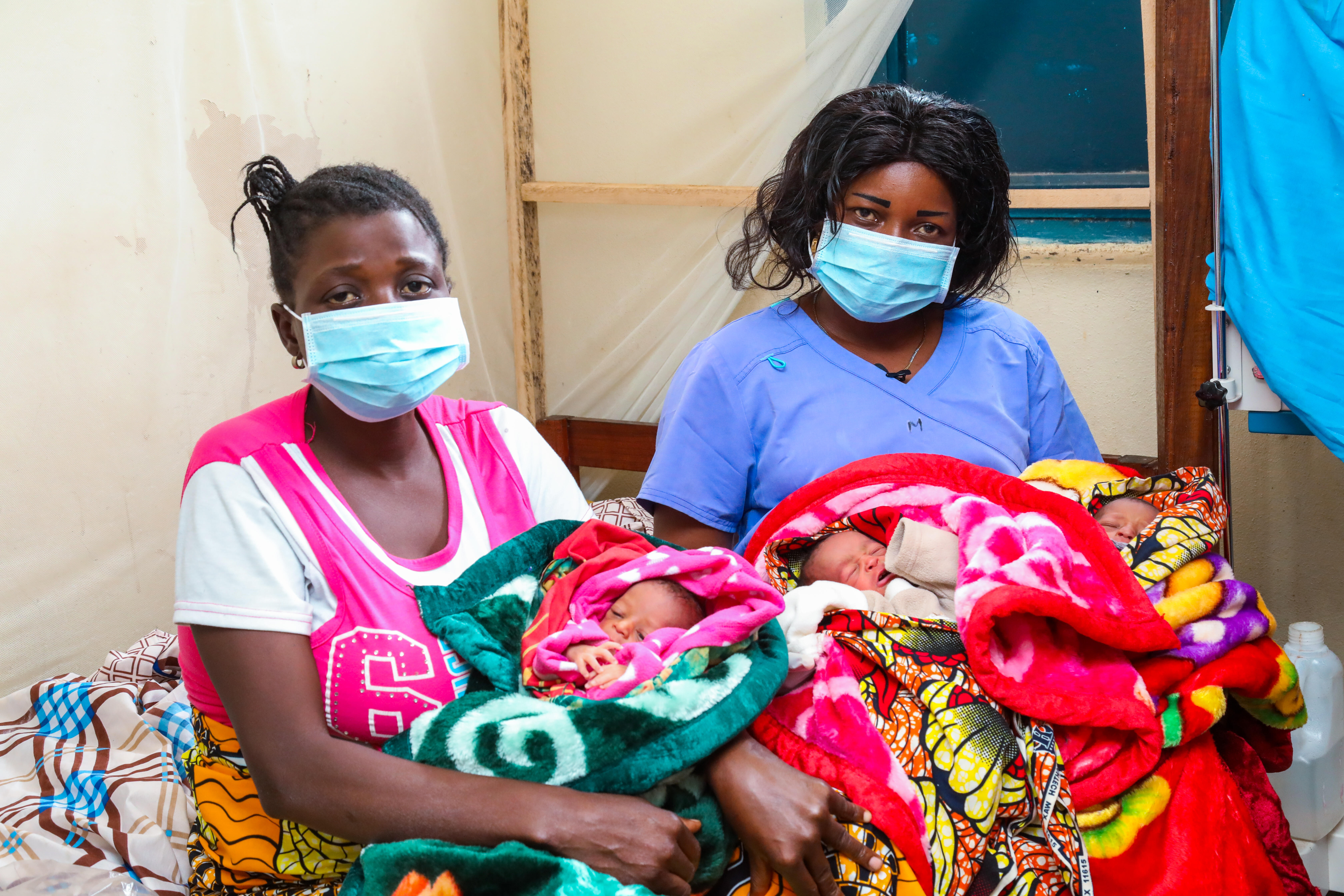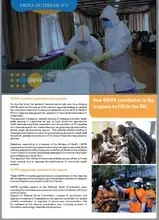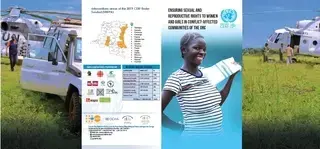Angela, 21, gave birth this month to triplets. All three babies are doing well, but the mom is very concerned. No abdominal and pelvic echography and no prenatal consultations were performed before Angela went into labor. At the first signs of her pregnancy, Angela simply decided to live in hiding to escape the Ebola medical investigation team. She knew that although she was totally cured of Ebola, she would have to use contraception for about two years before having a safe pregnancy.
SAVING LIVES AT ALL COSTS
Her recklessness became a matter of major concern as the Mwira Maternity team in Mangina had no choice but to save her life and also the lives of the three babies she was carrying. Dr Marina Maha Vugho, the Head of the medical team within the Mangina maternity, declares that she and her colleagues live under the permanent fear of both Ebola and Coronavirus contamination because all cases of pregnancy complications of more than 100 km around are referred to this maternity unit whose main users still don't believe in the existence of COVID-19 disease. With a very sad look, she declares that since the official end of the 10th epidemic of the Ebola virus disease on June 25, 2020, her maternity is witnessing the 4th case of risky childbirth caused by a woman that recovered from Ebola virus and who have not respected contraception for two years as prescribed by the medical response team. Her sadness is worsened when she recalls that at the onset of the illness (August 2018), eleven of her colleagues were infected by their patients in this same maternity hospital.
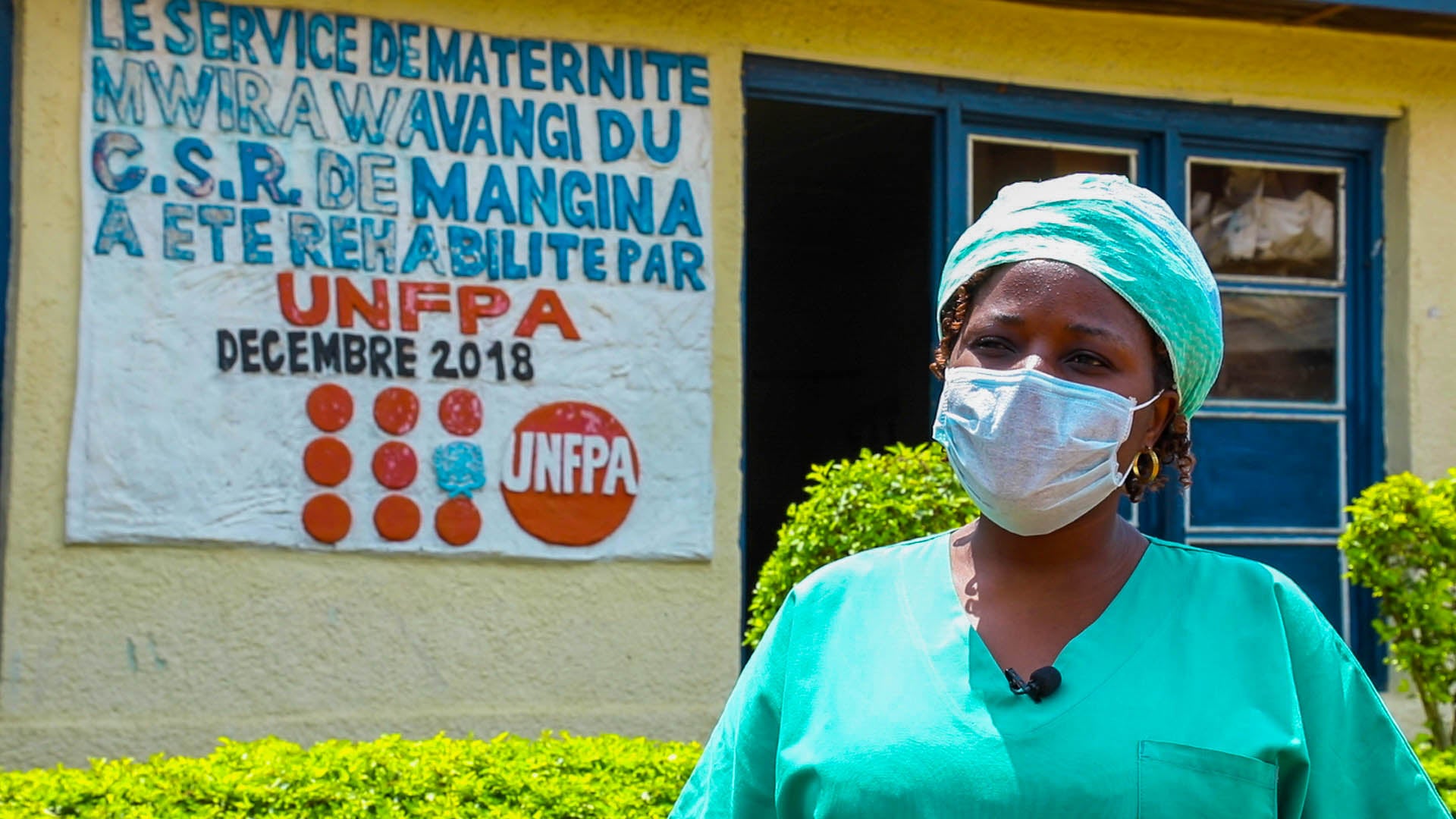
With financial assistance from the Paul G Allen Family Foundation, the United Nations Population Fund launched a strategical support to the Congolese Ministry of Public Health to reduce the risk of Ebola transmission in reproductive health services and maternity settings. This initiative comes as a response to growing evidence that reproductive health services and maternity wards frequently manipulate several types of biological fluids throughout the continuum of reproductive and maternal health care; ranging from gynecological consultations to waste management after child birth. Within the framework of delivering her reproductive health advocacy mandate, UNFPA in DRC aimed to reduce the heavy toll that health care workers had already paid since the outbreak of the Ebola Viral Disease (EVD). In fact, more than 5% of those who died of Ebola Virus Disease (EVD) were health workers who became infected while exercising their duty of administering care to their patients. It was clearly demonstrated that they developed the disease after having contact with a patient’s body fluid. To break this chain of transmission, UNFPA in partnership with WHO and the DRC Government committed to strengthening the infection prevention and control(IPC) in health facilities in the Ebola affected areas.
NEVER LOSE LIFE WHILE HELPING TO GIVE LIFE
Specific training modules have been developed and made available for midwives and skilled birth attendants working in areas considered at risk of contracting EVD. Detailed analysis revealed that specific needs of women and children were not sufficiently addressed in the first three strategic response plans to the disease. Hence, while implementing the fourth strategic response plan the focus on infection prevention and control in reproductive health services and maternities was a critical innovative approach. The partnership between UNFPA and the Ministry of health targeted some 400 midwives in more than 300 health facilities in high-risk areas. Midwifery supervisors were identified, trained and deployed to reinforce infection prevention and control measures within maternity wards of the two provinces of North Kivu and Ituri. Dr. Monique KAPAMBA, a National Reproductive Health Program Manager led the teams of trainers hired by UNFPA to build the capacity of medical personnel in Ebola affected areas. She confessed that reproductive health services and maternities constitute high-risk environments for the transmission of EVD. She stated that: “Obstetric care and more specifically child birth, an act of giving new life, carries a very high risk of contamination with the virus through biological fluids. Moreover, in maternity wards, pregnant women and newborns are potential vectors of EVD due to their compromised immune system. Therefore, it is urgent and important to strengthen preventive measures in maternity hospitals located in risk areas». Moreover, activities of infection prevention and control in gynecological and obstetric environments such as the installation of isolation spaces, compliance with standard IPC measures, compliance with IPC standards during child birth etc., are essential measures to break the disease’s chain of transmission. She concluded that “the supervision of IPC activities in maternity wards was crucial for the implementation of the IPC complete minimum package while also maintaining the IPC performance within gynecological-obstetric environment».
UNFPA FOCUSES ON MATERNAL HEALTH
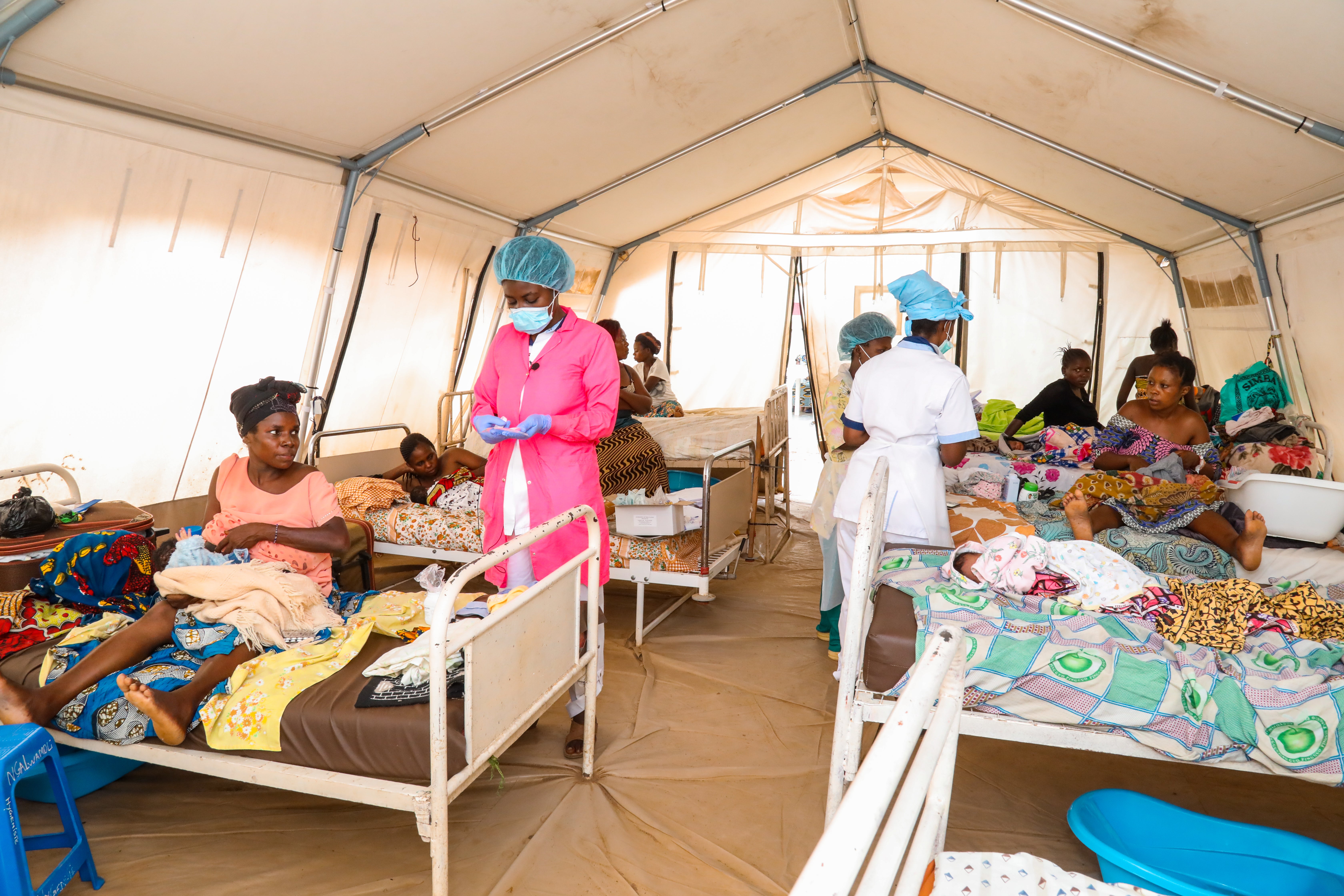
To meet its objective of eliminating preventable maternal deaths and achieve target zero Ebola transmission in reproductive health services and maternities, UNFPA alongside with the Ministry of Health and the Ebola response coordination team ensured that every health care provider was able to apply all standard preventive measures against any form of Ebola contamination during prenatal consultations, labor surveillance, childbirth, post-natal care and waste management in maternity wards. Therefore, it is a critical and lifesaving intervention to train health personnel on stringent Ebola preventive measures while assisting pregnant women and when conducting deliveries, including obstetric complications, and family planning services. Thus, UNFPA builds capacity of midwives and skilled birth attendants and deploys IPC focal points and supervisors in the health zones.
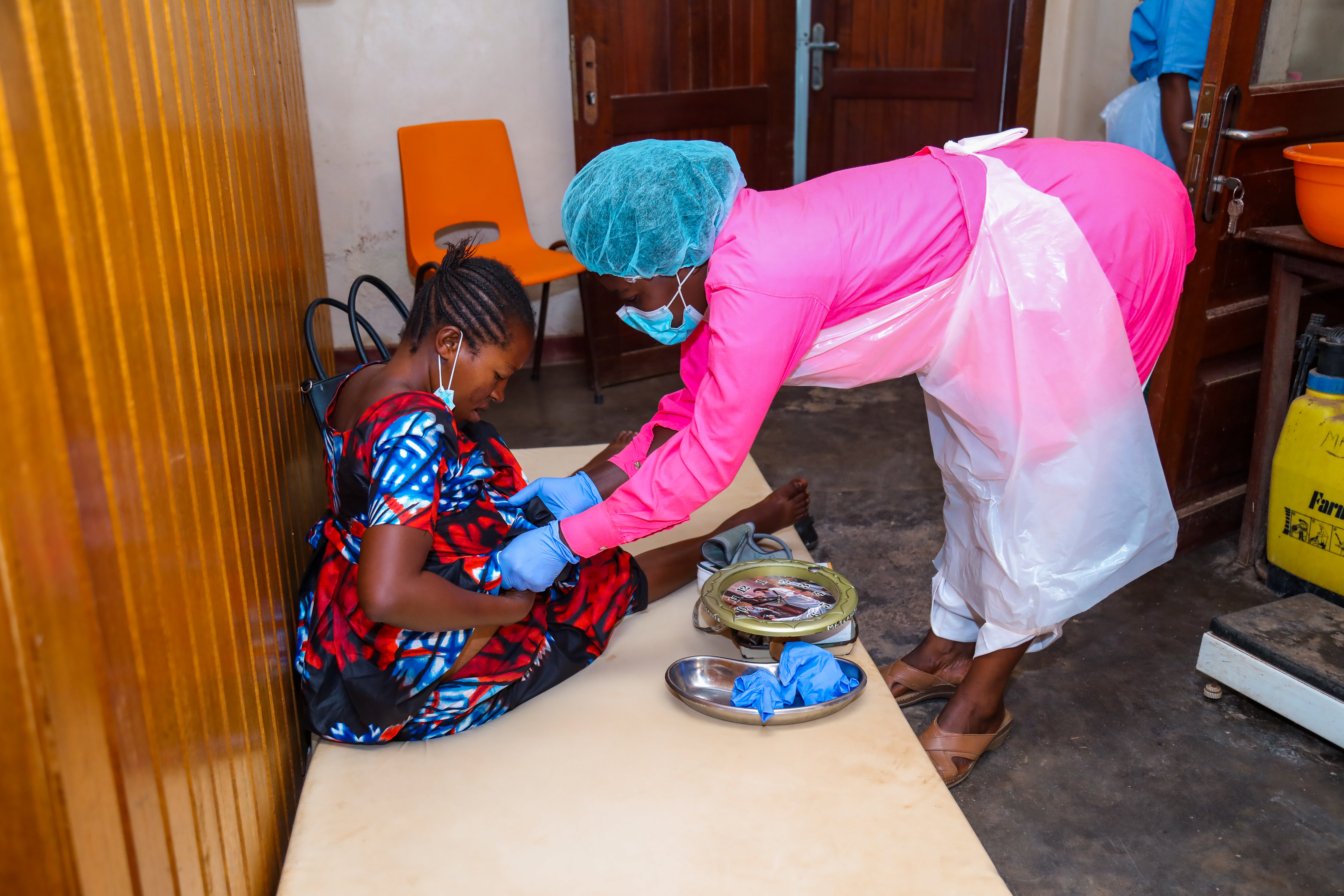
According to the UNFPA-DRC Humanitarian Coordinator who doubles for UNFPA response coordinator for the EVD, Dr Polycarpe Takou, “These trainings of medical doctors, gynecologists, midwives and birth attendants are the materialization of UNFPA’s commitment to support the implementation of the current national strategic response plan against EVD. This initiative aims to ensure that application of preventive measures becomes a reflex and routine attitude developed by health personnel. That is why UNFPA has put in place a system of regular supervision of these trained personnel to monitor the change of attitude. In addition to the trainings and related supervisions, UNFPA provides maternities with essential equipment to ensure full implementation of IPC measures and render them Ebola free places. ‘These initiatives are complementary to the rehabilitation and equipment of several maternities in the EVD hotspots of Mangina, Beni, and Katwa.”
USING THE YOUTH TO BLOCK THE ROAD TO EBOLA
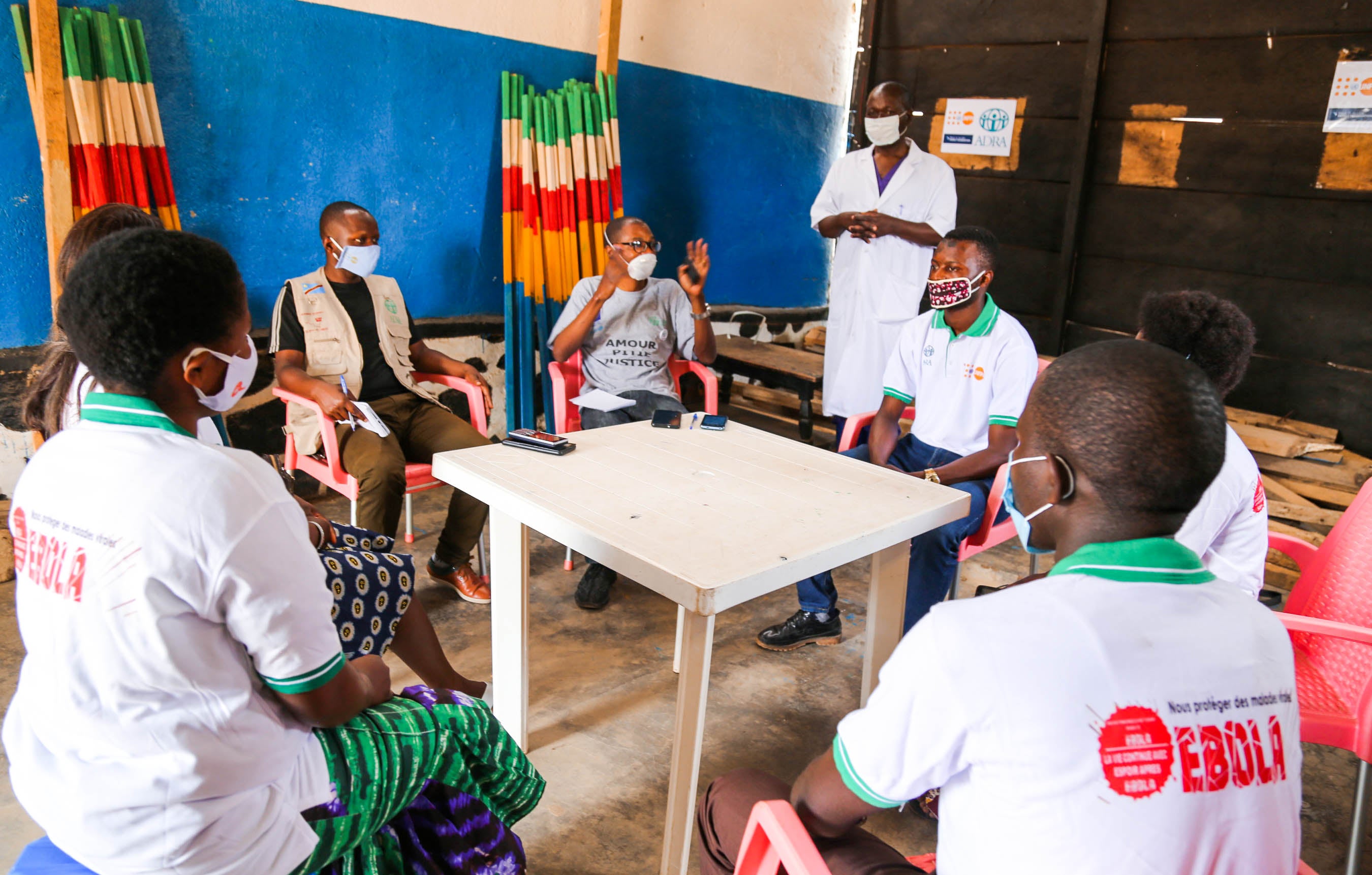
In the DRC, the tenth epidemic of EVD broke out on the eve of the 2018 general elections. This gave rise to a lot of rumors and false information. The persistence of the disease led to a postponement of the voting in the territories of Beni and Butembo. For opinion leaders and young people, it was more of a political maneuver to prevent the vote and that in reality Ebola did not exist. The conspiracy thesis found a favorable echo among the youth and nearly forty health centers were attacked in the city of Beni. Murderous attacks against the response teams were recorded leading to the suspension of its activities in the town of Butembo. This rejection has proven to be dangerous because the case fatality rate of this tenth epidemic exceeded 60%. To address this situation, UNFPA focused its outreach activities to youth. Ten (10) youth organizations (7 in North Kivu and 3 in Ituri) have been identified and are supported in the health areas targeted by the project to carry out awareness-raising activities to strengthen community resilience in the post-Ebola period.
Briefing meetings and preliminary training were organized before the field trips in order to empower them to better carry out sensitization activities in the communities. These organizations have received support for awareness-raising activities in terms of megaphones, pictograms, data collection sheets, etc. to carry out activities in the communities.

